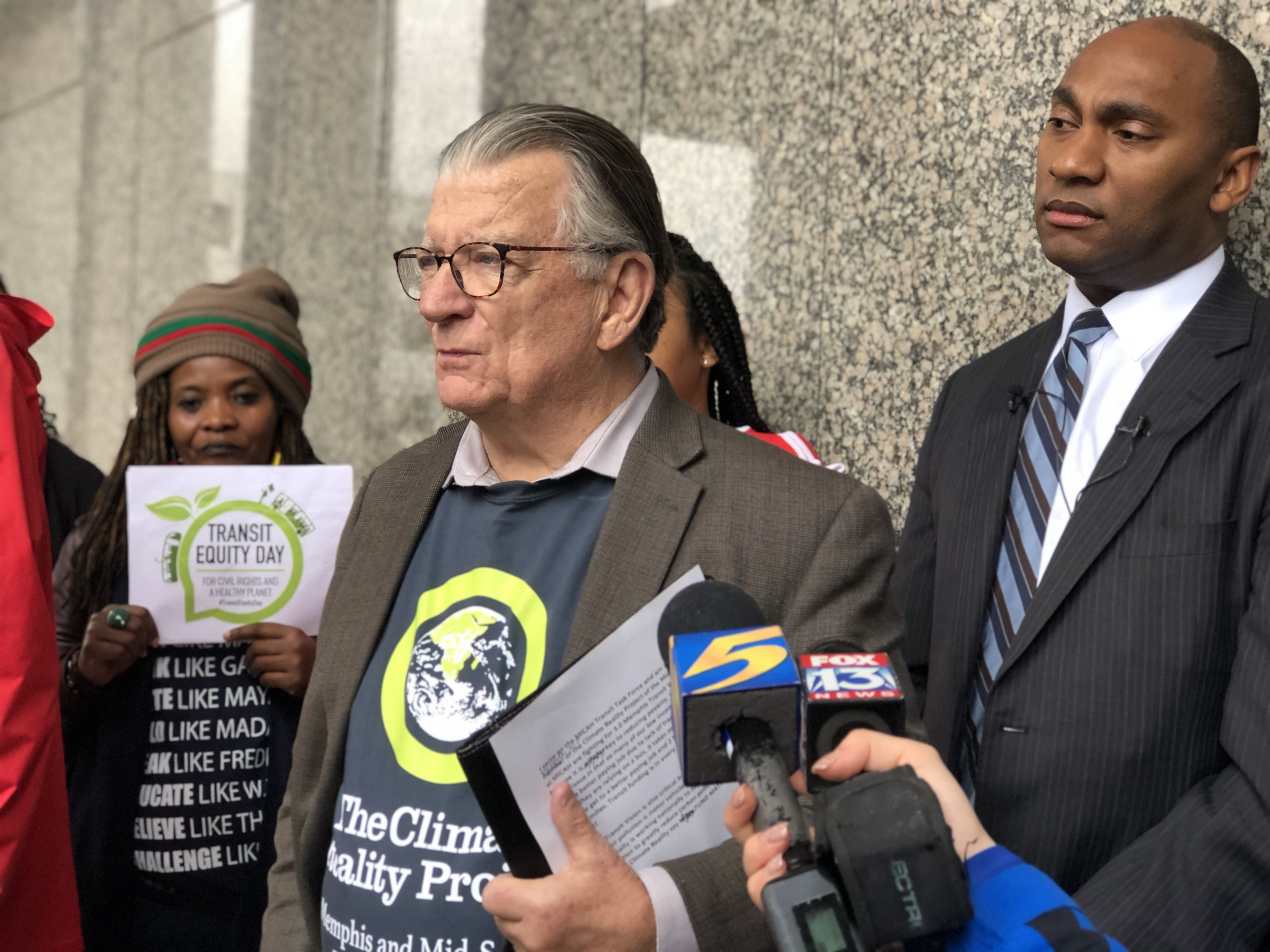
The conversation about adequate funding for the Memphis Area Transit Authority (MATA) continued Tuesday — a day deemed Transit Equity Day.
Transit Equity Day 2020, which marks the 106th birth anniversary of Rosa Parks, is a collaborative effort by several organizations and unions across the country to promote public transit as a civil right and strategy to combat climate change.
Here, the Sierra Club Chickasaw Group organized a press conference to speak on the importance of transit and the barriers that are still in place and limiting residents’ — particularly those of color and those living in low-income areas — access transit.
This comes as the Shelby County Commission considers a strategy to invest dedicated funding in MATA. The discussion began in September when Shelby County Mayor Lee Harris proposed a $145 sustainability fee for households with more than three vehicles. Now, the county commission is considering a $20 wheel tax increase.
Marquita Bradshaw, Environmental Justice Chair for the Sierra Club Chickasaw Group spoke of transit and environmental justice Tuesday: “Transit equity has everything to do with environmental justice.”
[pullquote-2]
“Environmental justice is the fair treatment and meaningful involvement of all people regardless of race, color, national origin, or income with respect to development, implementation, and enforcement of environmental laws, regulations, and policies,” Bradshaw said. “Transit equity is a plan to justly transition away from climate change. The root of climate change is pollution. People with lower incomes not only have problems accessing transit to get to work, but they also deal with the burden of pollution.”
Allison Donald of the Memphis Center for Independent Living, also at Tuesday’s press conference, said Memphis is at a “pivotal point” as it relates to funding transit.
“We must understand on the 106th birthday of Rosa Parks, that transit justice is not a new fight, not only for Memphis but for other underserved communities around the country,” Donald said. “Funding for public transportation is necessary not only for our city to grow, but it brings businesses, better educational opportunities for underserved children in underserved communities, and it gives people an opportunity to do what communities are supposed to do — connect.”
The most recent resolution to fund transit before the commission is sponsored by Commissioner Brandon Morrison. The proposal includes a $20 increase to the vehicle privilege that would generate $12.8 million. Of that $9 million would go to MATA and the remaining $3.8 million would support the hiring of 51 new sheriff deputies in areas soon to be de-annexed from Memphis.
In January, the commission voted to delay voting on the resolution, sending the proposal back to the commission’s general government committee. The commissioners decided at that meeting to send the measure to an ad hoc committee.
In order for the wheel tax proposal to pass, at least nine members, or two-thirds of the Shelby County Commission, must vote in favor of the move at two consecutive meetings.
Harris, who was at Tuesday’s press conference said securing the funding is a “huge challenge,” but he believes the resolution is close to garnering the nine votes it needs to pass.
“I think it’s time to seal the deal,” Harris said. “How do we seal the deal from here? We’ve got to get that ninth vote. We feel like we’re sitting at a soft eight and we need that ninth vote. We’re working real hard to build comfort with the commissioners so that we can get to a place where at least nine commissioners are prepared to vote on dedicated funding for transit.”
Some commissioners maintain that their constituents, mainly those living in the suburbs, don’t support the increase as they don’t use public transit and won’t benefit from increased funding for it.
“There’s a benefit to all of us from transit,” Harris said. “We’re trying everything except for the kitchen sink to try and identify that ninth vote. We think we’re on the way. We have a great case that’s been made and a broad coalition. We trust that the commissioners will see we can’t be about just talking about issues. We have to be about action.”
[pullquote-1]
Harris said with upwards of $10 million invested in MATA each year, there will be over one million new transit rides generated.
Courtney McNeal with Innovate Memphis, who worked closely with MATA to develop the Transit Vision Plan, said a key focus when creating the plan was job accessibility.
With the implementation of the Transit Vision Plan, McNeal said there would be a 39 percent increase in job accessibility within an hour for all residents, a 45 percent increase for minority residents, and a 49 percent increase for residents living in low-income neighborhoods.
MATA CEO Gary Rosenfeld said his group “stands ready” to implement the Transit Vision Plan, which “goes so far in delivering quality service and opportunity to the community as a whole.”
Last month, the mayor set an informal, 30-day deadline for the passage of a resolution to fund MATA, but it does not look like the commission will make that deadline.
Now, the the $20 wheel tax and other funding options for MATA are being discussed in a series of six ad hoc committee meetings, co-chaired by Commissioners Tami Sawyer and Mick Wright. The committee has been tasked with returning to the commission with recommendations about how to move forward.
All meetings run from 5:30 p.m. to 7 p.m. and are open to the public. See the dates and locations below.
2/4 – Monumental Baptist Church, 704 S Parkway East
2/11 – Hickory Hill Community Center, 2910 Ridgeway Road
2/18 – Hollywood Community Center, 1560 N Hollywood Street
2/25 – Agricenter International, 105 S. Germantown Parkway
3/10 – Bartlett Senior Center, 5727 Woodlawn Street
3/35 – Golden Gate Cathedral, 3240 James Road